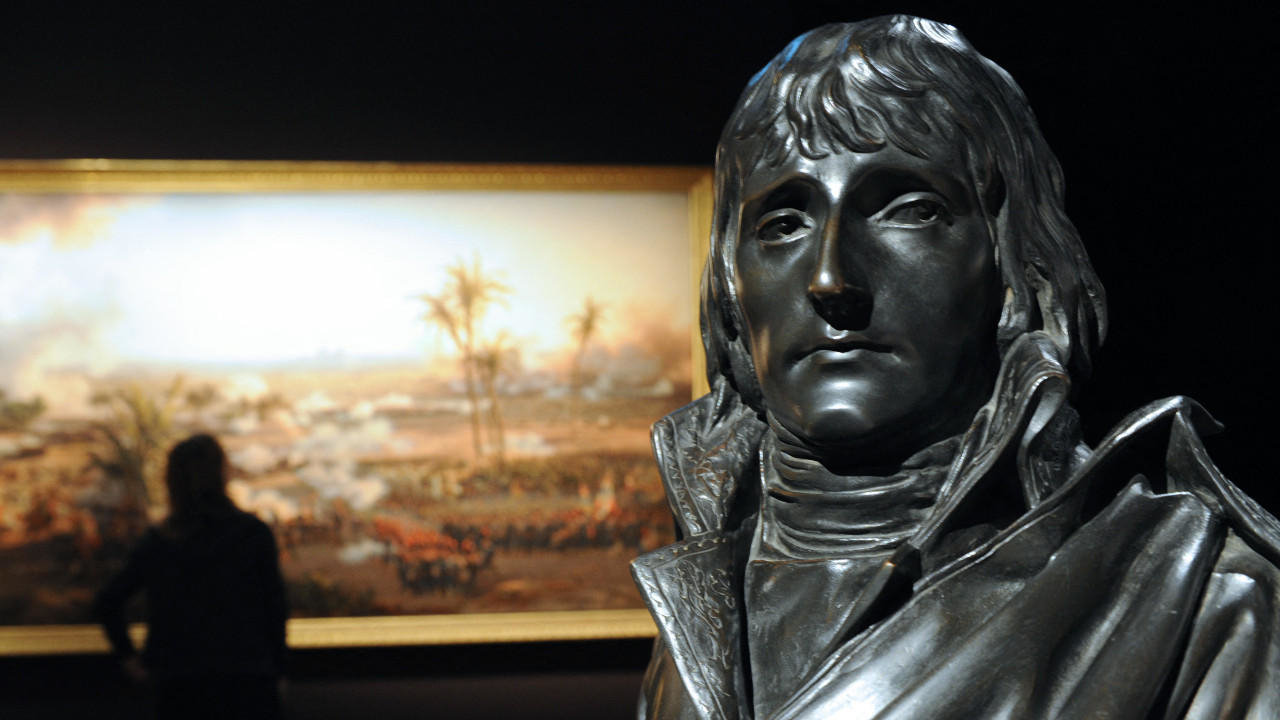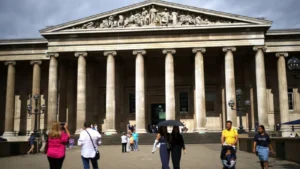
A bronze statue of Napoleon as part of the exhibition on his Egyptian campaign, ‘Bonaparte et l’Égypte, feu et lumières’, at l’Institut du Monde Arabe in Paris, on October 10, 2008
As the world marks the bicentenary of Napoléon Bonaparte’s death on May 5, FRANCE 24 looks at the Egyptian campaign he launched in 1798. It was a military disaster for France – but also a political springboard for the future emperor, as well as a cultural and scientific enterprise that played a crucial role in the development of modern Egypt.
Advertising Read more
More than 300 French naval ships left the Mediterranean port Toulon for Egypt on May 19, 1798. Nearly 54,000 people, including more than 36,000 soldiers, set sail under General Napoléon Bonaparte’s command. The 29-year-old future emperor launched the campaign at the behest of the Directory controlling revolutionary France with the official objectives of freeing Egypt from the tyranny of the Mamluk ruling warrior class and cuting off Britain’s route to India.
Napoléon’s well-equipped force enjoyed easy victories initially – notably the capture of Alexandria and the Battle of the Pyramids. But the military operation soon turned into a fiasco as the British Royal Navy, under the command of Horatio Nelson, sunk the French fleet in the Battle of the Nile in August 1798 (a preamble to the 1805 Battle of Trafalgar off the Spanish coast, when the legendary British admiral smashed Napoléon’s navy for good).
The Egyptian campaign culminated in further humiliation with the British and Ottoman victory in May 1799 in the Siege of Acre, now in Israel – compounded by the plague epidemic that struck the massed French soldiers. Napoléon fled back to France on August 22, 1799, managing to evade the Royal Navy but leaving his troops behind to eventually surrender on August 31, 1801.
Bonaparte Before the Sphinx, an 1886 painting by French artist Jean-Léon Gérôme displayed at Hearst Castle in California. © Wikipedia Creative Commons
Despite the humiliation of Napoléon’s military forces, the campaign left a rich cultural and scientific legacy.
“To start with, the Napoleonic propaganda back home in France focused on the military triumphs, hailing Bonaparte as the man who won big victories in the land of the Pyramids and the Pharaohs,” explained Robert Solé, a Franco-Egyptian writer renowned in France for several Egyptological books.
“But since the expedition ended in military failure after three years, the emphasis shifted to the campaign’s cultural and scientific significance.”
‘Laying the foundations of Egyptology’
The expedition produced considerable achievements in these fields. “Their unprecedented work constituted a milestone in the history of science – laying the foundations of Egyptology as a discipline,” Solé said. “Bonaparte’s scholars didn’t just uncover Egypt’s ancient past for the world – but also for Egypt itself, as Egyptians were uninterested in their pharaonic history at that point, dismissing it as pagan.”
The French revolutionary strain of the Enlightenment regarded Ancient Egypt as the ultimate origin of civilisation – and so the expedition was seen as a way of “bringing civilisation back to its cradle”, said Solé.
“It was in this spirit that Napoléon – who explicitly disavowed any link with the Crusades – went to conquer Egypt,” he said.
Indeed, Napoléon told his troops as they landed at Alexandria: “The people we will be living alongside are Muslims; their first article of faith is, ‘There is no other god but God and Muhammad is his prophet’. Do not contradict them; treat them as you treated the Jews and the Italians; respect their muftis and their imams as you respected the rabbis and bishops.”
Having long modelled himself on Julius Caesar and Alexander the Great, Napoléon cemented this instruction with a classical reference – reminding his troops that, “the Roman legions protected all religions”.
“This was a violent imperialist operation and military operation,” Solé said. But until Gamal Abdel Nasser’s military coup overthrew the Egyptian monarchy in 1952, it was “accepted” that Napoléon’s invasion had “brought modernity” to the country.
Bonaparte’s campaign was a “pivotal moment” in Egyptian history, Solé said. “One should be careful not to lavish praise on the expedition, given the violence involved. But modern Egypt began with Napoléon’s invasion. It had a huge effect – sweeping away the Mamluks’ tyrannical political system and opening the way for Muhammad Ali, who founded the modern Egyptian state in the mid-19th century.”
But ever since Nasser’s coup, “Napoléon’s campaign has been described as just a foreign occupation, the main effect of which was the awakening of Egyptian nationalism”, Solé said. “So the French expedition has been largely ignored; at present it’s hardly taught and little known in Egypt.”
As well as changing the course of Egyptian history, Napoléon’s campaign also had an impact on his own destiny in France. It played a crucial role in propelling him from being France’s foremost political figure to securing the title of First Consul of the Republic in 1799 – and then to his coronation as Emperor of the French in 1804.
In 1798, it was still “too early” to seize power from the revolutionary Directory that ruled France as a group, Solé noted. “Napoléon could see that very clearly, and he was convinced that his path forward would take him through the East – which held an obvious attraction for the young general, fascinated as he was by Alexander the Great. And he was right to think so.”
This article was translated from the original in French.
Daily newsletterReceive essential international news every morning Subscribe








